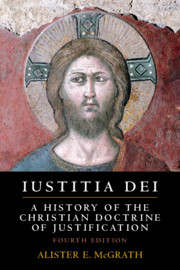Book contents
- Iustitia Dei
- Iustitia Dei
- Copyright page
- Contents
- Tables
- Preface to the Fourth Edition
- Abbreviations
- Introduction
- Part I Justification
- Part II The Middle Ages
- 4 The Nature of Justification
- 5 The Righteousness of God
- 6 The Concept of Grace
- 7 The Human Appropriation of Justification
- 8 Justification and the Two Powers of God
- 9 The Concept of Merit
- 10 Justification and the Sacraments
- Part III Protestantism
- Part IV Catholicism
- Part V The Modern Period
- Conclusion
- A Brief Glossary of Medieval Soteriological Terms
- Works Consulted
- Index
5 - The Righteousness of God
from Part II - The Middle Ages
Published online by Cambridge University Press: 27 January 2020
- Iustitia Dei
- Iustitia Dei
- Copyright page
- Contents
- Tables
- Preface to the Fourth Edition
- Abbreviations
- Introduction
- Part I Justification
- Part II The Middle Ages
- 4 The Nature of Justification
- 5 The Righteousness of God
- 6 The Concept of Grace
- 7 The Human Appropriation of Justification
- 8 Justification and the Two Powers of God
- 9 The Concept of Merit
- 10 Justification and the Sacraments
- Part III Protestantism
- Part IV Catholicism
- Part V The Modern Period
- Conclusion
- A Brief Glossary of Medieval Soteriological Terms
- Works Consulted
- Index
Summary
This chapter continues the exploration of the development of the doctrine of justification during the Middle Ages, focussing on the important concept of the ‘righteousness of God (Iustitia Dei)’. The chapter opens with some preliminary reflections on medieval understandings of Iustitia Dei, before moving on to discuss the highly significant contributions of Anselm of Canterbury to early medieval discussions of divine righteousness and the rationality of faith. This leads into a discussion of whether the ultimate basis of divine justice is to be discussed within an intellectualist or voluntarist framework, noting the quite distinct approaches found in writers such as Aquinas and William of Ockham. An important development which becomes of considerable significance in the fourteenth century is the use of covenantal understandings of the nature of divine righteousness, and the process of causality which lies in someone being ‘made righteous’. This theology of the Pactum, particularly associated with the via moderna, is explored, and its potential implications assessed. Finally, the chapter considers the discussion of the nature of the analogy between divine and human justice, and its implications for wider discussion of theological themes in this period.
- Type
- Chapter
- Information
- Iustitia DeiA History of the Christian Doctrine of Justification, pp. 82 - 102Publisher: Cambridge University PressPrint publication year: 2020

